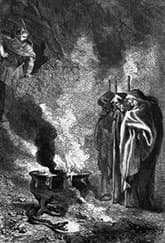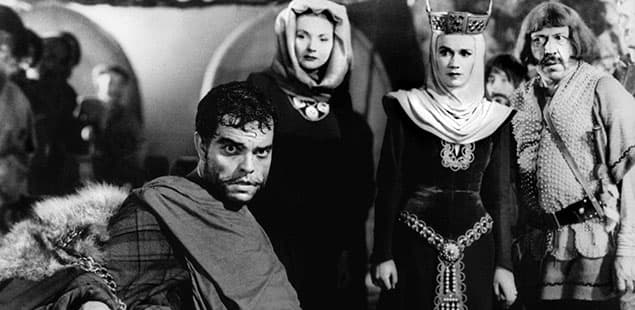Macbeth
Critique • Quotes • At the movies
 Illustration, 1858 edition
Illustration, 1858 editionOriginal title
The Tragedie of Macbeth
Written
1603
First performed
1606
First published
1623, in Folio
Literary form
Play
Genres
Tragedy, historical drama
Writing language
English
Author's country
England
Length
Five acts, 2,392 lines, approx. 16,500 wordss

Orson Welles's flashy direction and flashing eyes cannot save his attempted adaptation of Macbeth.
Toil and trouble for ill-fated play
Macbeth (1948): Film, 107 minutes; director Orson Welles; writer Welles; featuring Welles, Jeanette Nolan, Dan O'Herlihy, Roddy MacDowall
Fewer mainstream cinematic productions have been made of Macbeth than of some of Shakespeare's other great plays, perhaps because it's been felt the unrelenting darkness of Macbeth would discourage movie audiences.
When Orson Welles proposed directing such a film in the 1940s, he faced this skepticism from producers, as well as a reluctance to engage him due to his reputation for being difficult and for running over budget. He was turned down repeatedly by studios, who called the shots in those days, until finally Republic took a chance, on the condition that he would complete the film in three weeks for under $700,000—a very small budget even in those days.
Orson Welles' Macbeth (1948) turned out even darker than the original play. It was shot entirely in black and white, and used many of the same dramatic camera angles, characters moving in and out of shadows, and extreme close-ups that Welles had employed to such great effect in his previous black-and-white film, Citizen Kane.
The interpretation of Macbeth is blacker yet. Every sentence of dialogue is plumbed for its horrific possibilities, and delivered intensely as the camera moves in on terrified eyes and sweating brow. Welles is himself a constantly brooding Macbeth. Whether spoken aloud or voiced over, his words are always despairing products of a mortified soul. This is a man who never feels a moment of peace or triumph, even when he is raised to the monarchy and appears to have conquered all his enemies.
The evil ambition of Lady Macbeth is chillingly played in the early scenes by Jeanette Nolan (later the uncredited voice of Norman Bates's mother in Hitchcock's Psycho) and she is pathetically guilt-ridden in the second half of the film. But what's missing from this archetypal femme fatale is the seductiveness—whatever it is that twists her husband around her finger to get him to do the awful the deeds she wills.
The witches hail Orson Welles's Macbeth in his 1948 cinematic version.
Another weak spot is the performance of the beloved Roddy MacDowall (Lassie Come Home, How Green Was My Valley, Planet of the Apes). The child star just barely out of his teens obviously has no idea how to play Shakespeare and his Malcolm is a syrupy-voiced youth who seems most unlikely to avenge the murder of his father and depose Macbeth.
Dan O'Herlihy (Robinson Crusoe, Kidnapped, The Dead) makes his American screen debut as Macduff, but despite being both a dashing leading man and a talented actor, he fails to portray the depth of the character whose family is slaughtered and leads a rebel army. Only when he gets to wreak his vengeance in the final sword duel with Macbeth does he come alive.
These are failings that may be attributed to the lack of preparation time for the actors in this rushed film. On the plus side, the decision to play the characters with Scottish accents, which is less common that you might think and has been derided by some, does work to add a gritty verisimilitude. "Gritty" also describes the sets, as does "sparse". Dunsinane Castle seems nothing more than a collection of caves and landings hewn out of a mountain top. When armies venture outside the castle, the rough landscape is shrouded in mist. The three witches appear as hazy visions upon rocky crags.
Welles is quite faithful to Shakespeare's dialogue, refusing to dumb it down, but he does rearrange scenes drastically for dramatic effect.
It's hopeless though. Whether the hurried production, the low budget, or the darkness of the vision are to blame, the best combined efforts of Welles the director, Welles the screenwriter and Welles the actor cannot save this from being one dreary movie.
Several cuts of this film are available on video, ranging from an hour and a half to nearly two hours longest. Even the shortest is difficult to sit through.
— Eric

